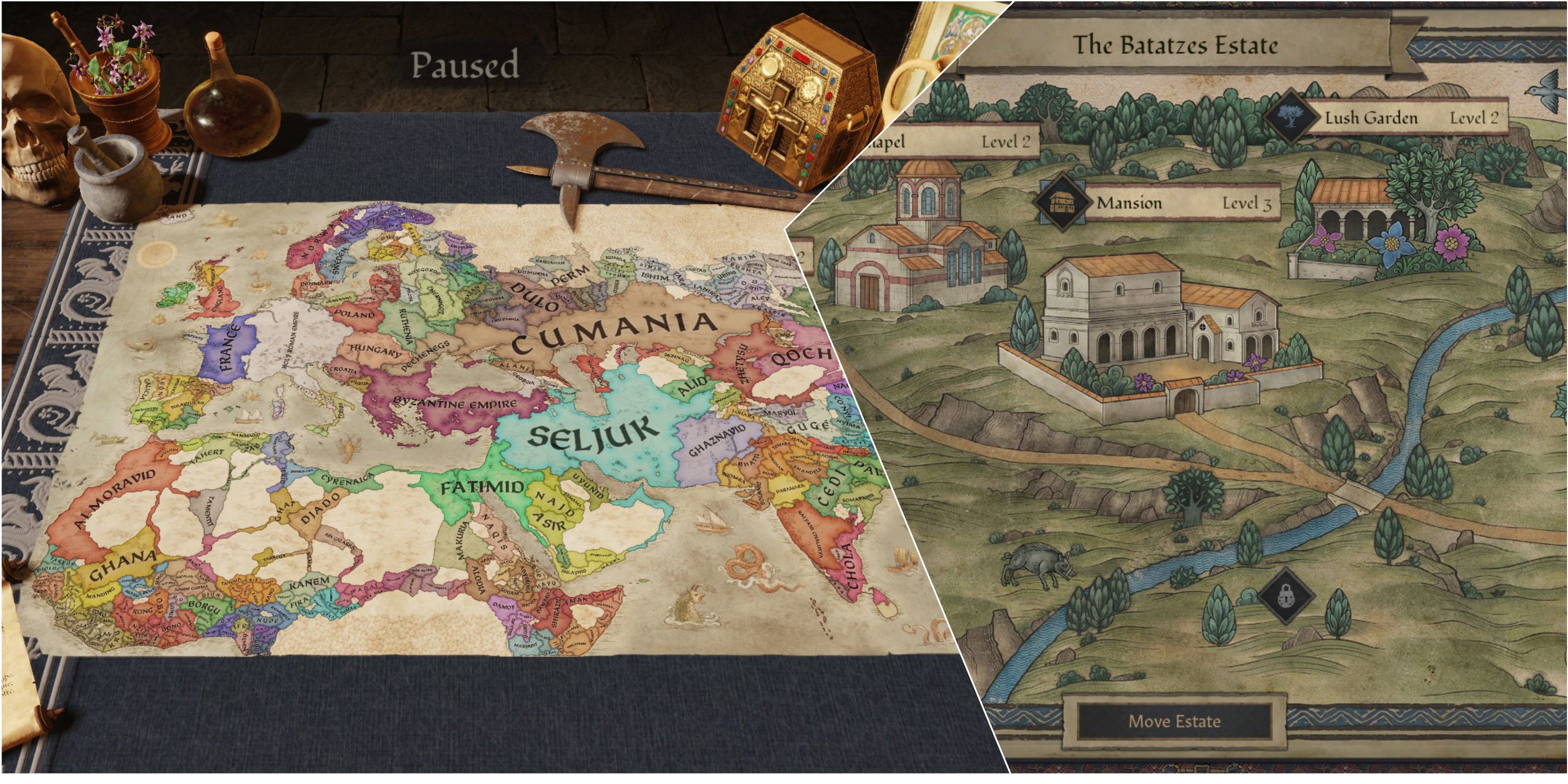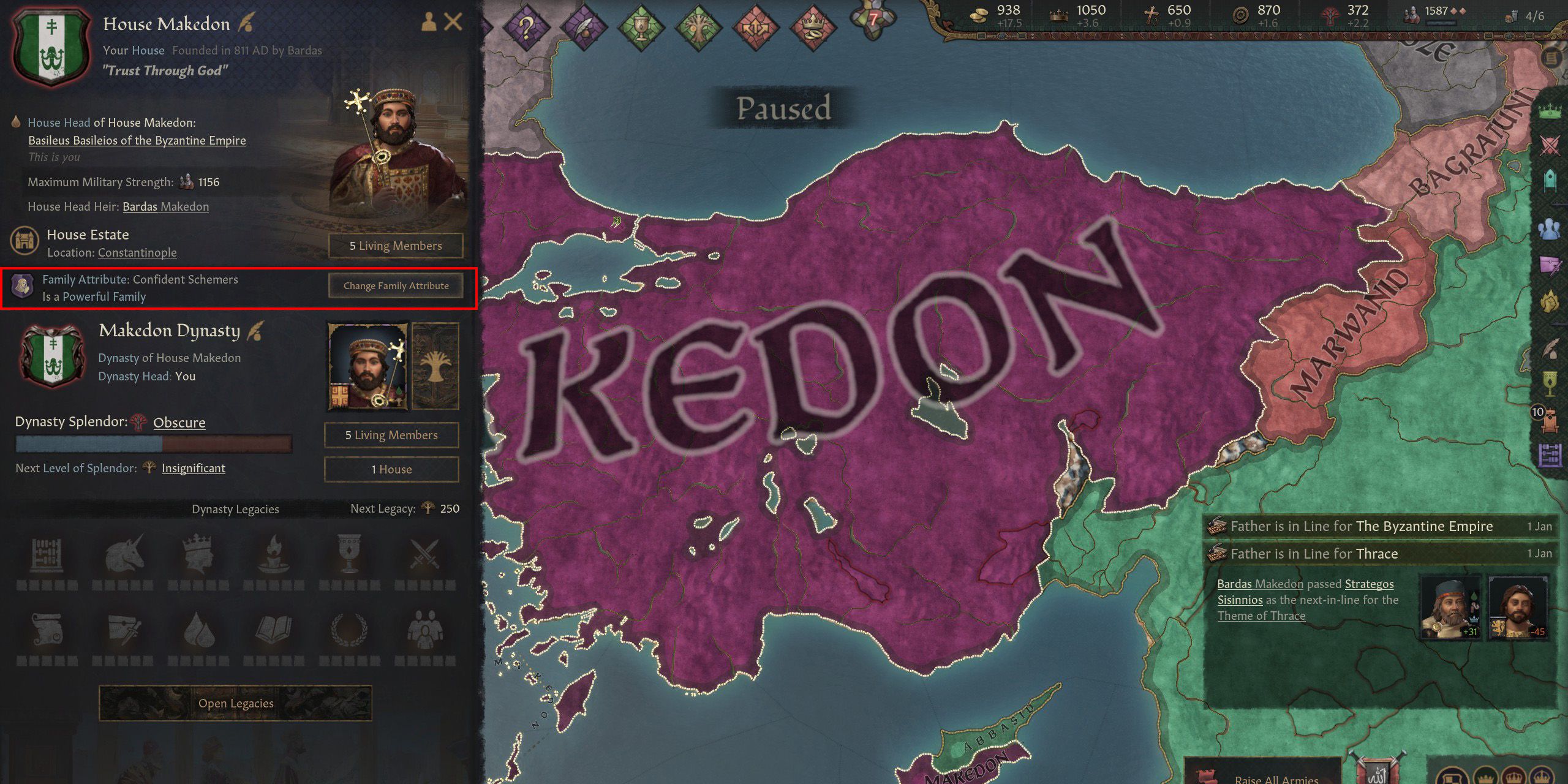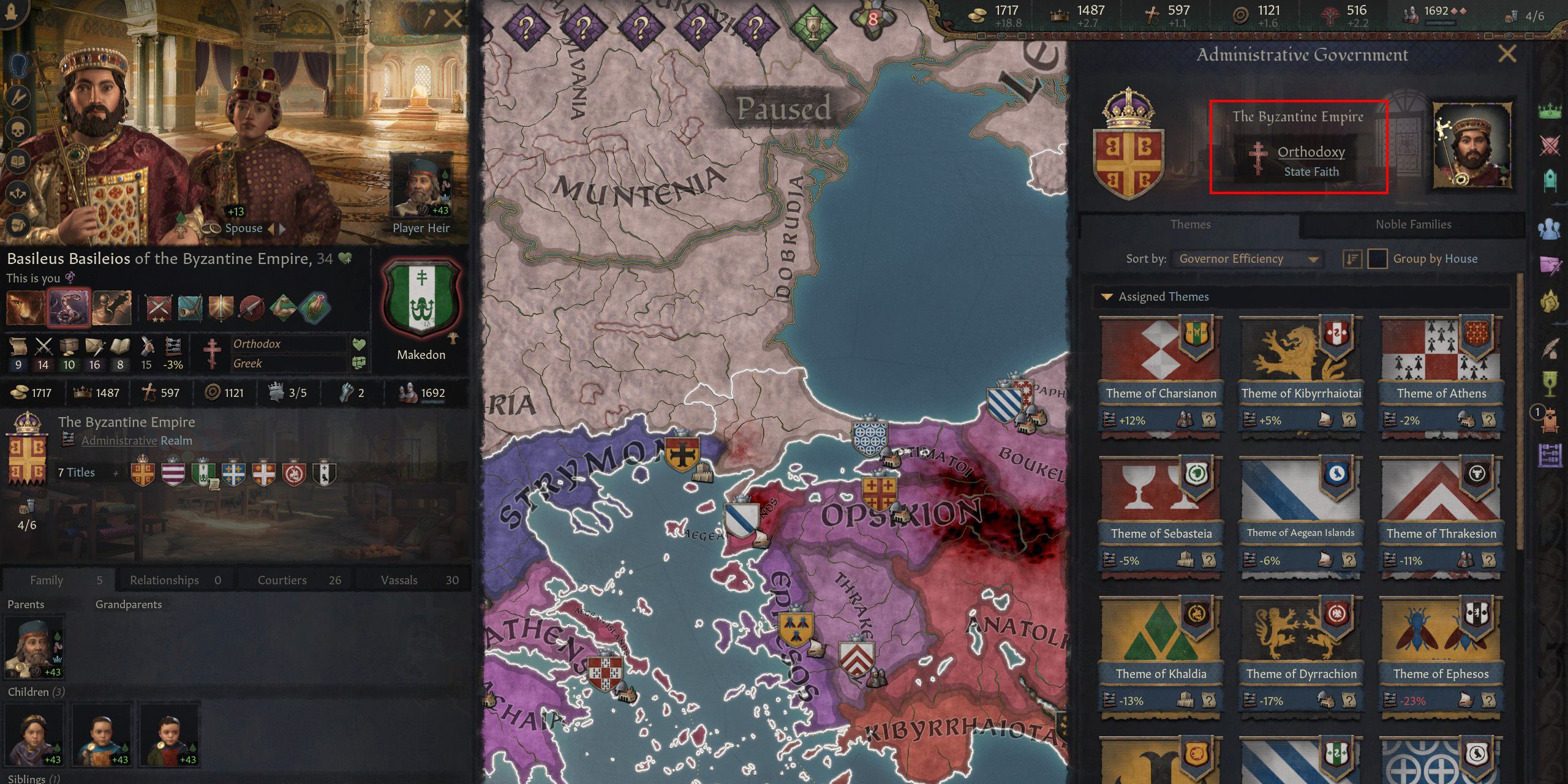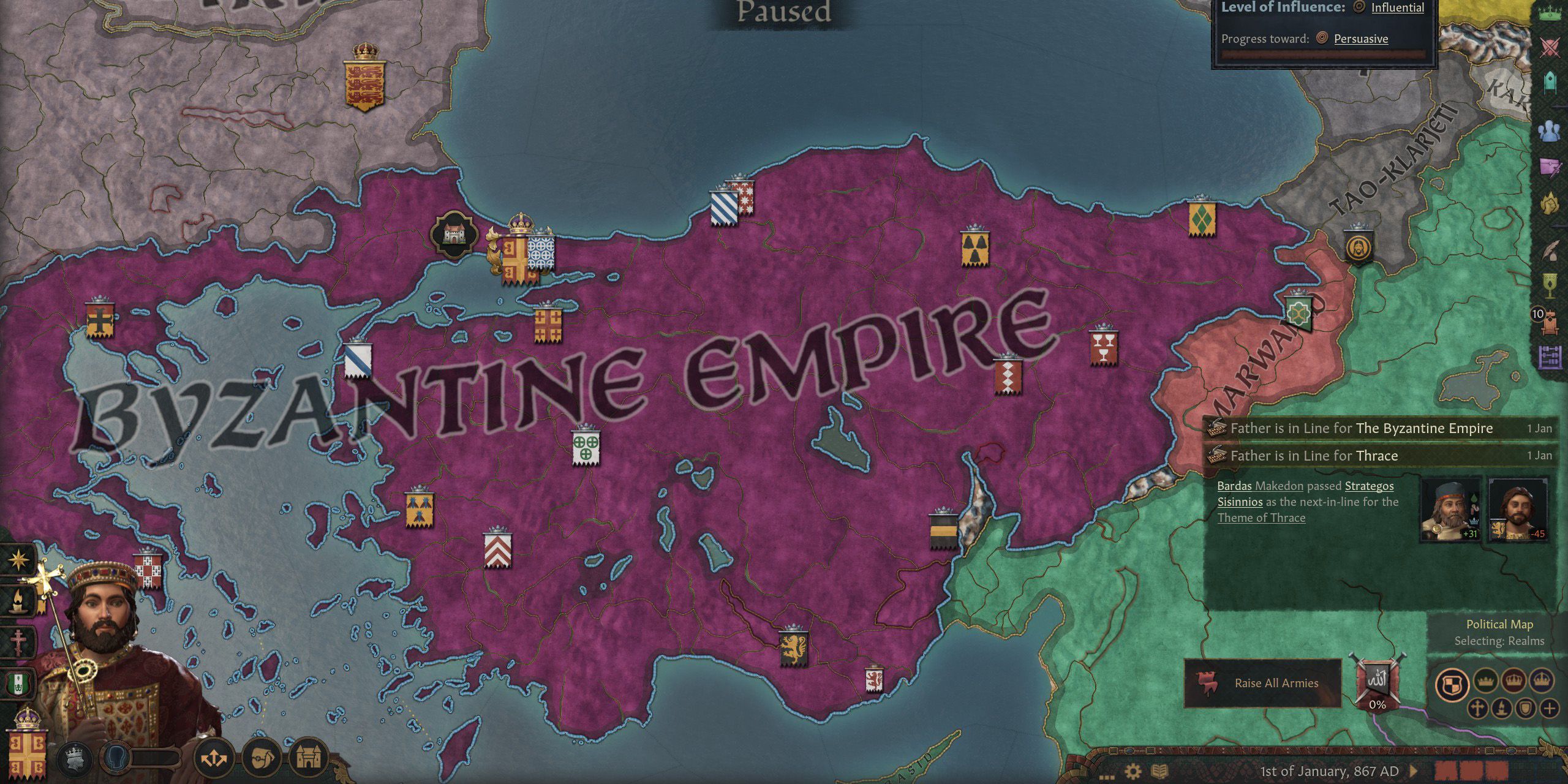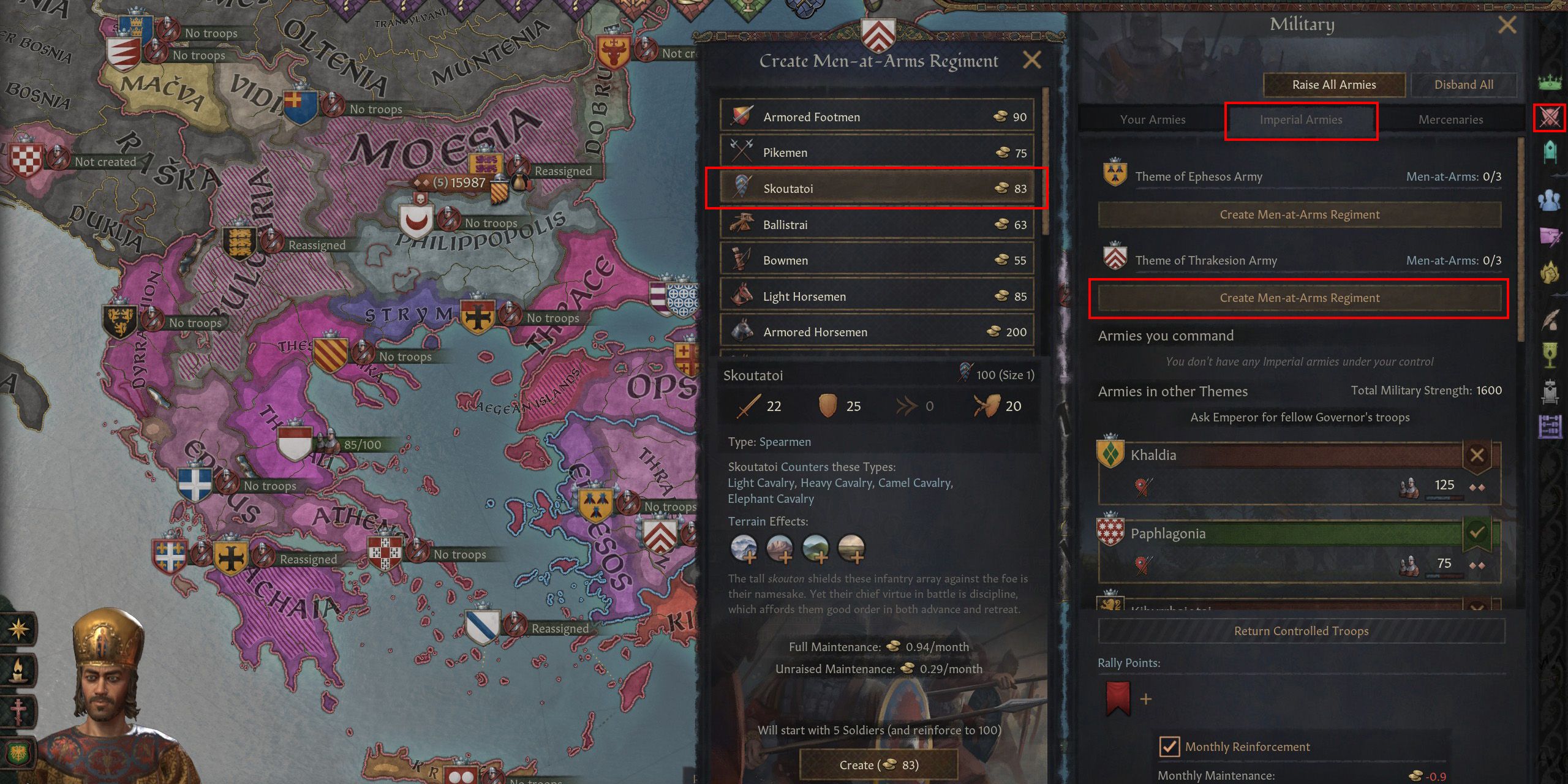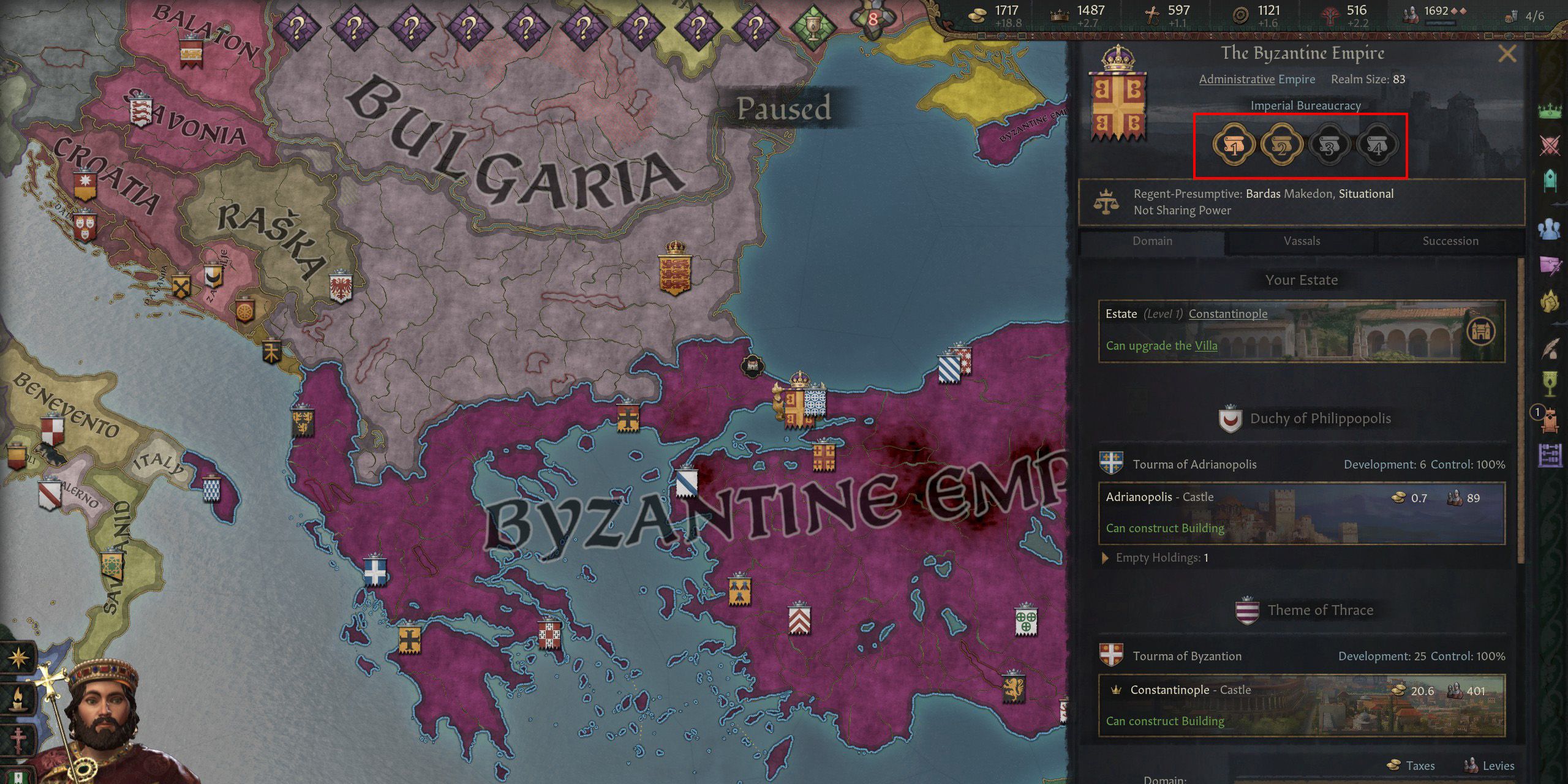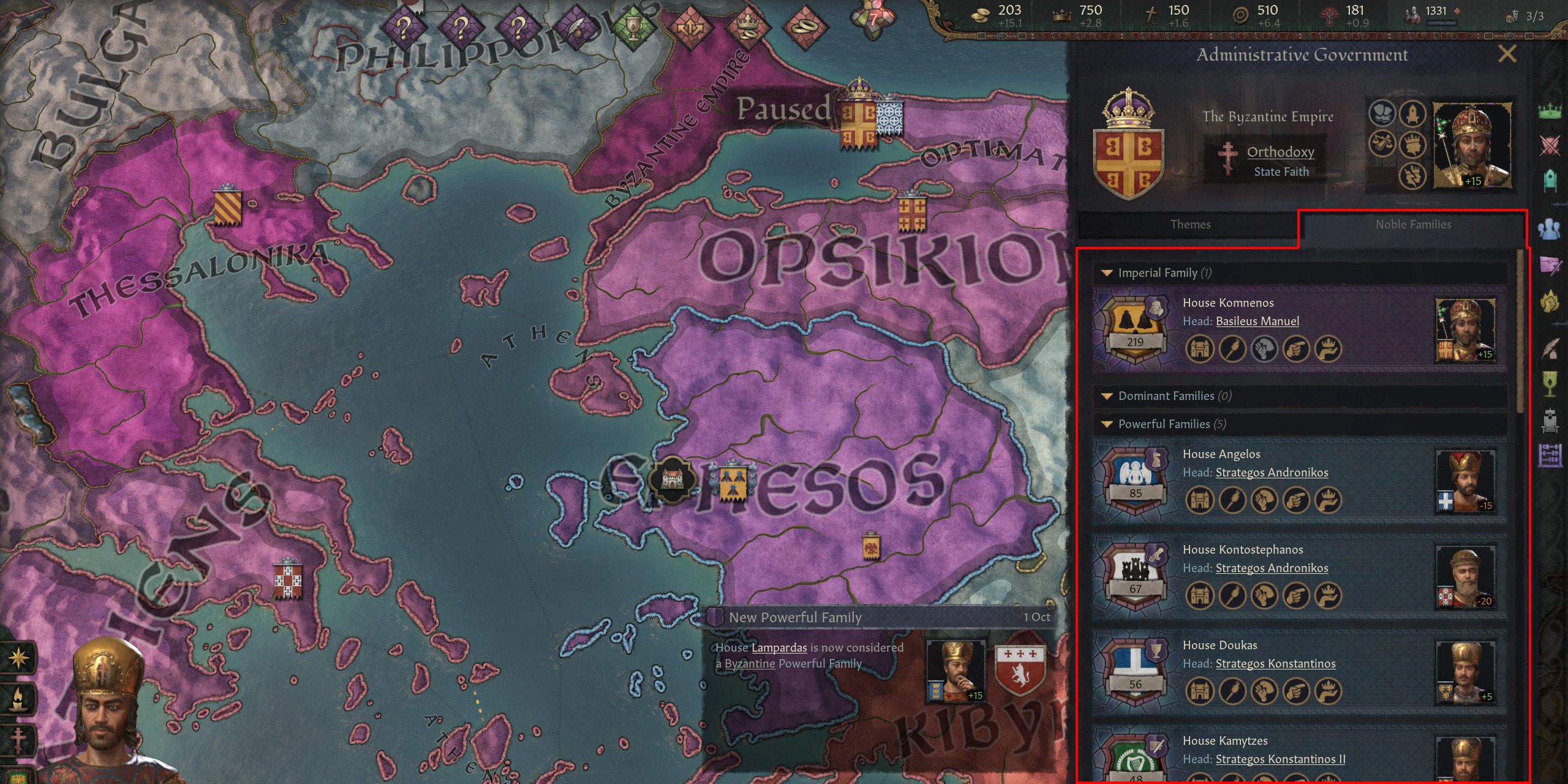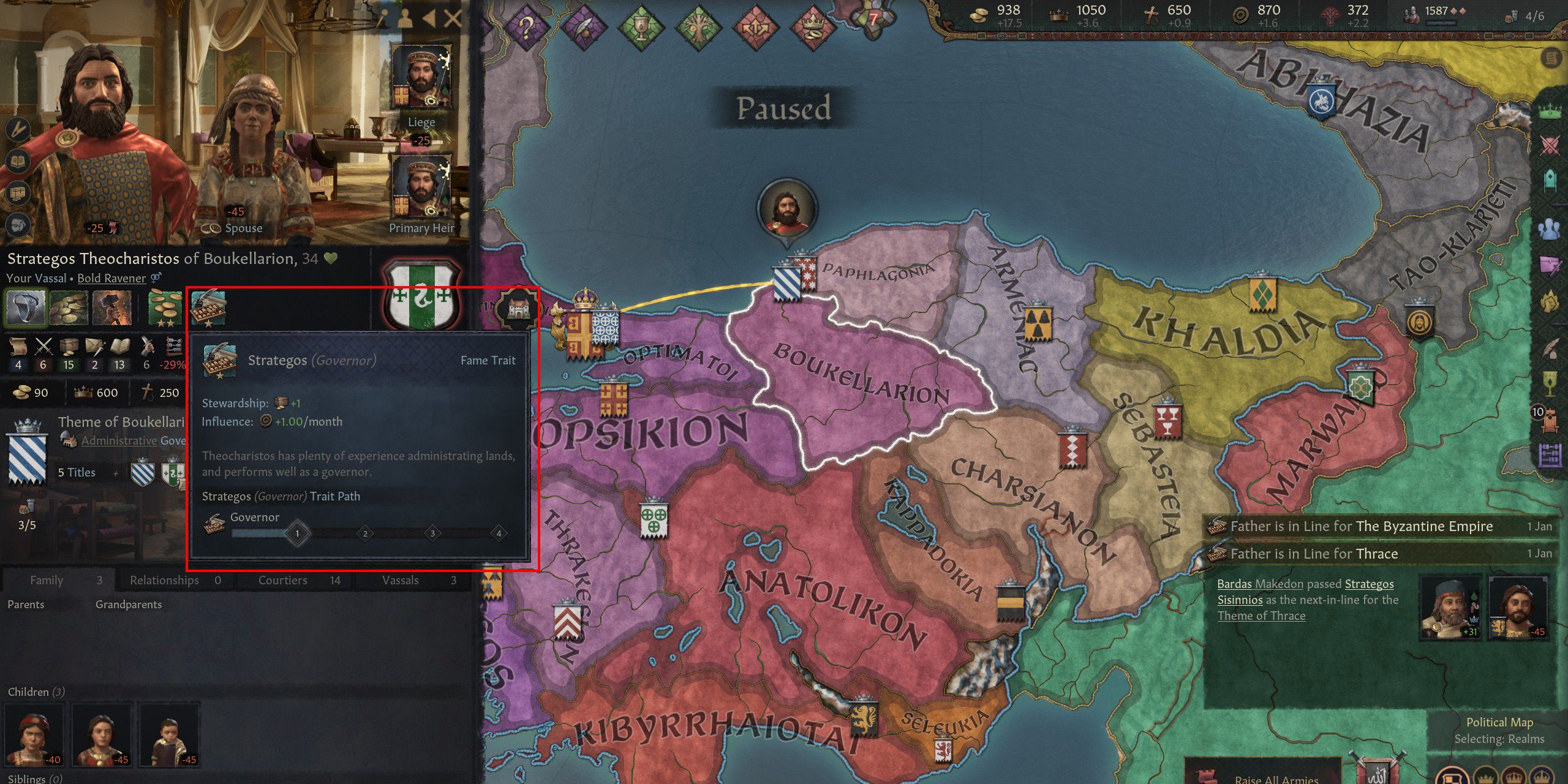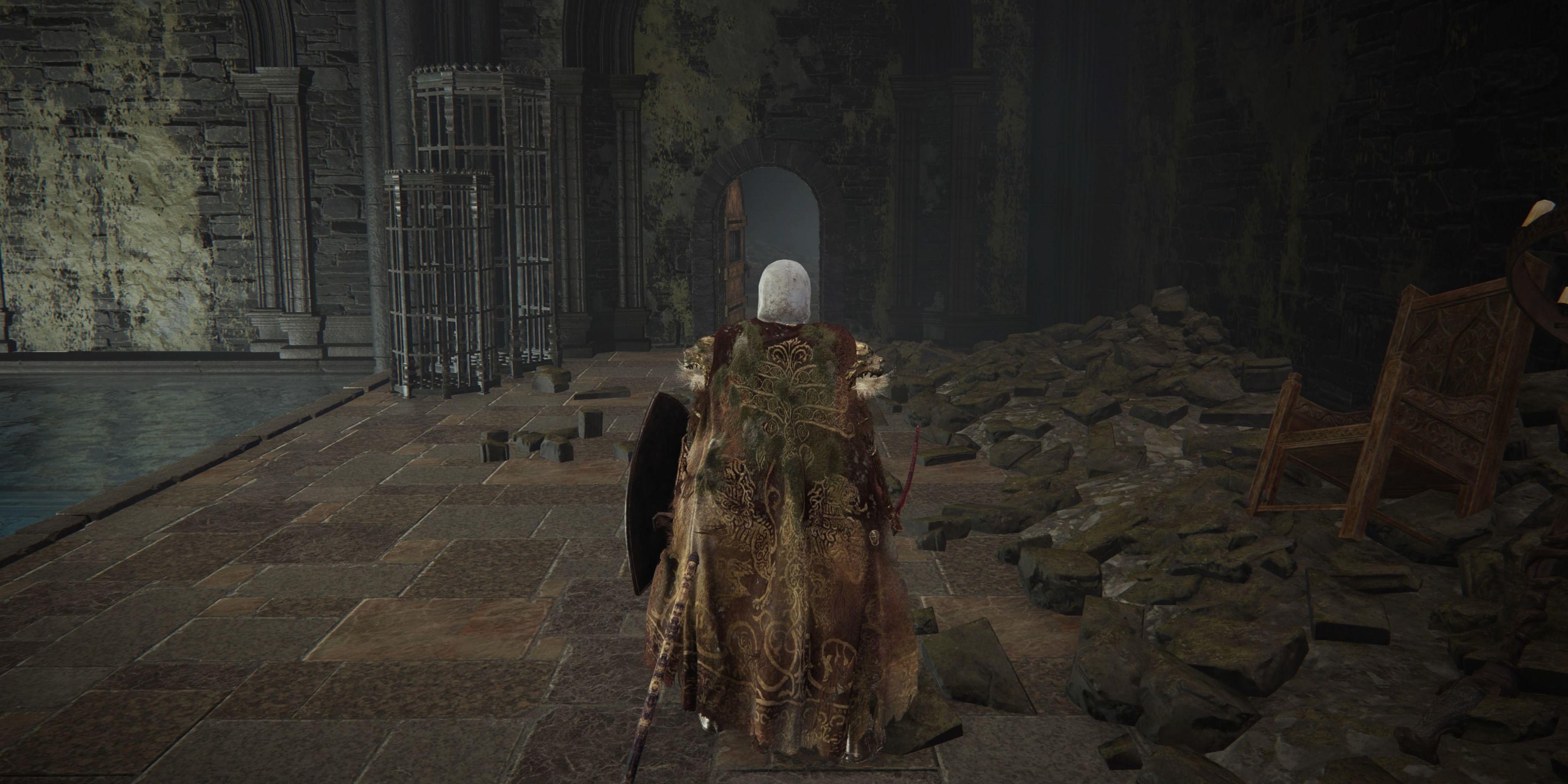Paradox Development Studio’s hit historical strategy game, Crusader Kings 3, has gotten better and better since its initial release, with subsequent updates and DLCs giving players loads more options and mechanics to play out their medieval stories and ambitions. From focused new mechanics designed to give life and flavor to specific regions of the game, to wide-ranging new systems which impact gameplay on whole new levels, a lot has gone into improving CK3 since its launch. The Roads to Power DLC is a massive expansion that adds a heavily requested ruler type – the Landless Adventurer – and an entirely new type of Government.
The Administrative Government type breathes new life into empires such as the Byzantine Empire, which was famed for its aptly named “Byzantine” system of government. Accessible to other empire-level titles that fulfill the requirements, the Administrative Government type has a lot of cool gameplay changes and additions which make playing it a very different experience from the traditional Feudal system of government. The Byzantine Empire especially benefits from this new Government type, as it’s available right from the start of the game, and gives many new options to both Byzantine Emperors and their Governor vassals. Let’s take a deeper look at the new Crusader Kings 3 Administrative Government type.
Noble Families in CK3 Roads to Power
Although the game is, broadly speaking, made up entirely of noble families, the Noble Family is a specific thing in Administrative Governments. These are high-ranking Administrative rulers and families in the realm, and they have access to the special Noble Estate which is located in a given province of the realm and which is owned independently of any Administrative titles. Within the Administrative Government type, Noble Families are the basic Administrative ruler the play can play. Noble Families of the Administrative Empire can attain further status by becoming Powerful or Dominant Families. Even the Emperor is part of a Noble Family, and the Noble Family forms the backbone of the Administrative Government type as well as the play style.
The Noble Estate
The Noble Estate is a special holding type similar to the Landless Adventurer’s Camp. The Noble Estate contains a Villa building, representing the main residence of the family, and has spots for six other buildings that offer gameplay bonuses depending on what the player chooses to build there. There’s a good range of different buildings to choose from, and each building has upgrades to its levels along with internal improvements. Players can choose from buildings that increase Influence or gold, or even from Barracks buildings that improve access to military units. The Noble Estate is visible on the map and can be entered by clicking on the icon where it occurs in its home province, which may be anywhere within the Empire depending on the specific family, but there’s also a new icon added next to the Lifestyle and Inventory buttons at the bottom left of the screen which opens the Estate too.
Noble Family Attributes
In Roads to Power, Administrative Noble Families have access to a special Family Attribute which confers a small bonus upon members of the Noble Family. The Noble Family Attribute can be changed from the Dynasty screen, which can be opened by clicking on the Dynasty shield either on the bottom left of the screen or by opening the character view and clicking on the larger shield there. Once in the Dynasty view, there is a button that allows players to change the Family Attribute.
The Roads to Power Influence Resource
In Roads to Power, the Administrative Government type has access to and uses a new ruler resource type called Influence. Influence can be spent on various things, like appointing and revoking Governorships, taking control of Imperial armies, and much more. Some new events are sources of Influence, while others will take it away. This is a key resource type for Administrative Rulers because it can directly impact their ability to retain titles – the Appointment Succession type for example involves directly spending Influence to appoint heirs. Influence can be gained by landing members of the Noble Family, through Schemes, from Estate buildings, and through completing Governor Issues.
This is really useful because Influence can also be spent on useful things, such as Favors from the Emperor or acquiring Governorships for Family members.
The Administrative Realm Tab
A new tab has been added to the right-side menu in Crusader Kings 3. This tab shows the Administrative Empire’s various Noble Families as well as the Themes/Governorates in the Empire. The two tabs can be switched between by clicking on their titles. The Noble Families screen is particularly useful because it shows which families are Powerful or Dominant. The Theme/Governorate screen also shows which titles have yet to be created, so it’s a handy way of seeing what’s available to grant to vassals or family members.
Crusader Kings 3 Roads to Power State Religion
An all-new religion mechanic has been introduced in Roads to Power for Administrative Governments, which can now adopt a State Faith. The State Faith of an Administrative Empire is the official Faith of the Empire. Although vassals can deviate from this Faith, it is easier to convert them to the State Faith and conversely, it is much harder for rulers to convert provinces away from the State Religion. This not only gives a good amount of flavor to Administrative Empires, but it’s also a nice mechanical benefit too, as it makes it much harder for unwanted heresies to spread throughout the realm.
New Succession Types
The Administrative Government type gains two powerful new Succession types, the Appointment and Acclamation Successions.
- Appointment Succession allows Emperors to spend Influence to appoint an heir of their choosing to titles
- Acclamation Succession rewards characters with the best Influence and grants them new titles
New Administrative Decisions
Roads to Power sees a number of new Decisions added to the Decisions tab specifically for Administrative rulers. One, such as the Legitimize Government Decision, can increase the Legitimacy of rulers. Others allow Governor vassals to scheme for power within the realm, or even retire from Governance altogether. These new Decisions are good ways to build support and increase Influence. The Governorship Confirmation replaces the Pay Homage interaction and allows Governors to receive bonuses from the top liege.
Roads to Power Political Schemes and New Interactions
14 new Schemes have been added with Roads to Power specifically to support the new Administrative Government type. These new Schemes and Interactions center on political machinations such as reducing a rival’s Influence or attempting to remove a Governor. These can be useful as both an Emperor and a Governor vassal, as even Emperors have to worry about influential Governors. The Challenge Status Scheme, for example, allows one character to steal Influence from another, while other interactions such as Force to Step Down can directly remove a Governor from political play. The new Schemes use the all-new Schemes system too. These new additions are available from the right click menu.
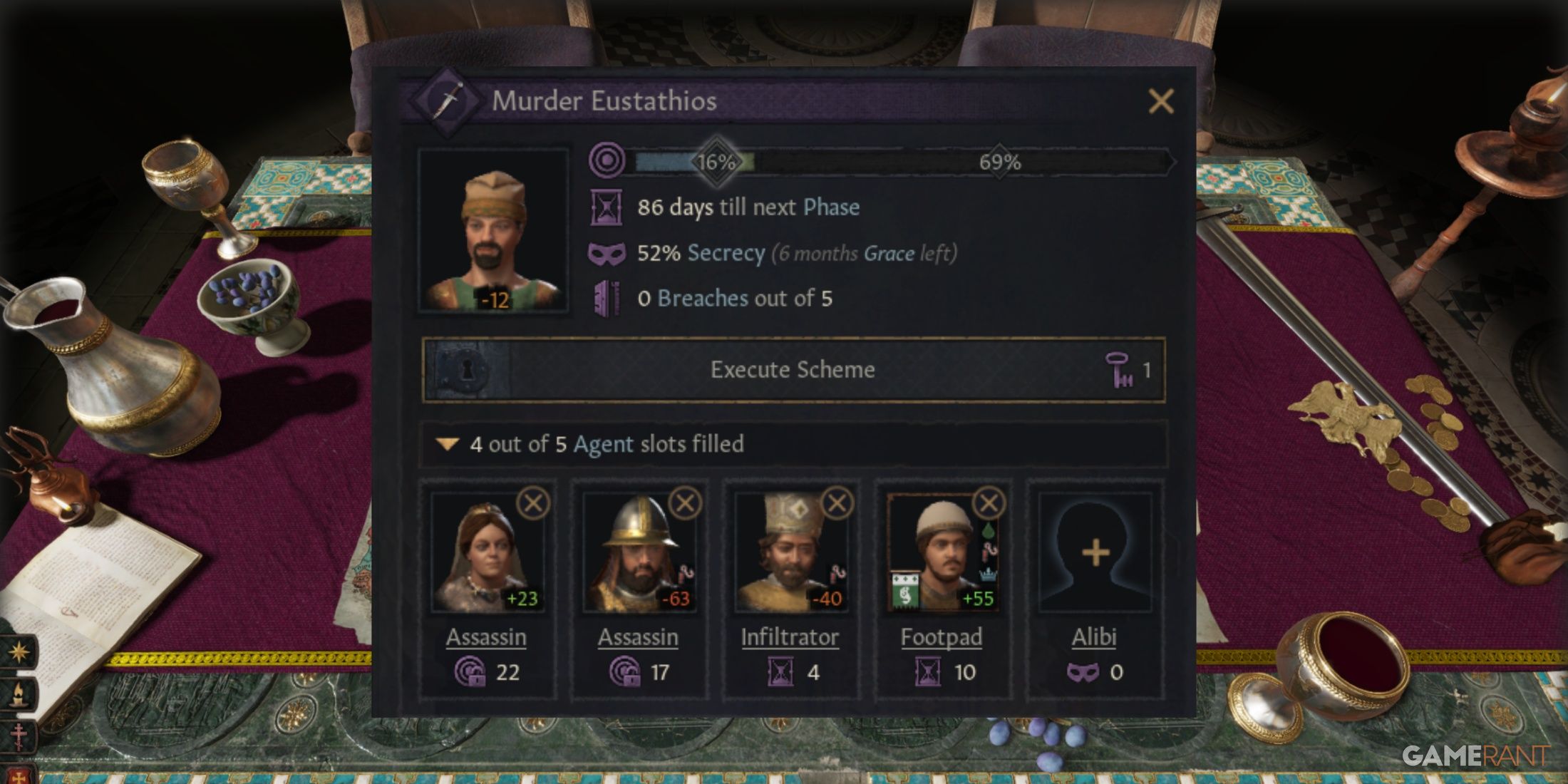
Related
Crusader Kings 3: How Do Schemes Work
Schemes in Crusader Kings 3 have been completely reworked, adding more depth and giving players more agency. So how do schemes work now in CK3?
Playing as the Administrative Emperor
The Emperor of an Administrative Empire has many unique options available to them which their Feudal, Tribal, or Clan counterparts would very much love to have. It’s much easier to Revoke Administrative titles, for example, and it’s also easier to prevent vassals from consolidating vast numbers of titles through hereditary inheritance.
New Vassal Obligation Types
There are six new vassal Obligation types available to use, which allows the Emperor of an Administrative Realm to change how a vassal Governor focuses his attention. These offer different types of bonuses, so it’s nice to able to set these separately for each Theme/Governorate.
- Imperial
- Balanced
- Civilian
- Frontier
- Naval
- Military
Imperial Armies
Administrative Rulers can create special Men at Arms regiments for use as Imperial (or Theme/Governorate) armies. The top liege of an Administrative Realm is able to seize control over any of these armies at will, which can be a massive boost in the right situation. Theme armies can be created from the military menu using the new Imperial Armies tab. Imperial Armies are available for vassals to create, which saves the Emperor money. These armies can be very useful when conquering new lands or defending the existing realm, especially since the Emperor doesn’t need permission to use them and can even take control over them while the vassal is at war.
Imperial Bureaucracy
Unlike other rulers in Crusader Kings 3, the Administrative Government type sets the level of Crown Authority for the entire realm, which follows that of the Emperor. This is incredibly useful because it means the entire realm follows the same laws regarding authority, so there are no awkward situations where vassals are allowed to do something they shouldn’t because they have a different level of authority to the top liege.
Playing as a Governor Vassal in Crusader Kings 3 Roads to Power
On top of the all new Influence system and the Noble Estates added in the Roads to Power DLC, the actual gameplay associated with the Administrative Government type is very different from the usual Crusader Kings 3 gameplay. Administrative Emperors aren’t too different, but life as a vassal Governor can be quite different from its Feudal, Clan, or Tribal counterparts in some very big and important ways.
This is because Governors have to deal with a lack of in-built heredity for their titles, and must instead scheme and spend Influence to acquire and maintain their titles and power. Noble Families often scheme against one another, and there are specific interactions such as the Raid Estate interaction which can be used to target other Noble Families without outright war. This is key because Governor rulers cannot declare war on each other.
War as an Administrative Vassal
This is a big change from other ruler types, but it’s at the core of the Governor play style. In order to win titles from fellow vassals, Governors must engage with the new systems introduced in Roads to Power. They must scheme and spend Influence to compete for favor and titles from the Emperor. Administrative vassals can delcare war against foreign rulers, and gain special Casus Belli to do so – the Duchy Expansion and County Expansion CBs.
Administrative Vassals cannot declare wars against each other.
Governor Traits
Administrative Governor rulers have a new special trait, the Governor trait. This trait and its level dictates how effective a Governor is at his job, which if reflected in the tax raising ability or the Governor’s ability to lead Imperial Armies. This trait influences promotions and an Emperor’s choice of commanders and councilors. Governor levels can be increased by completing Governor Issues.
Governor Issues
Much like the new Landless Adventurer ruler type, the Governor Ruler type can complete Governor Issues. Governor Issues have a wide range of types and they appear on the map much like their Landless Adventurer counterparts’ Contracts. Issues are a really good way to build up Influence and other resources depending on the resolution of the Issue. These new Issues provide a lot of flavor to Governor gameplay, and also provide nice bonuses. They increase the level of the Governor trait, too, making the character more effective as a Governor – increasing their tax intakes, boosting their ability to command Imperial armies, and so on.


